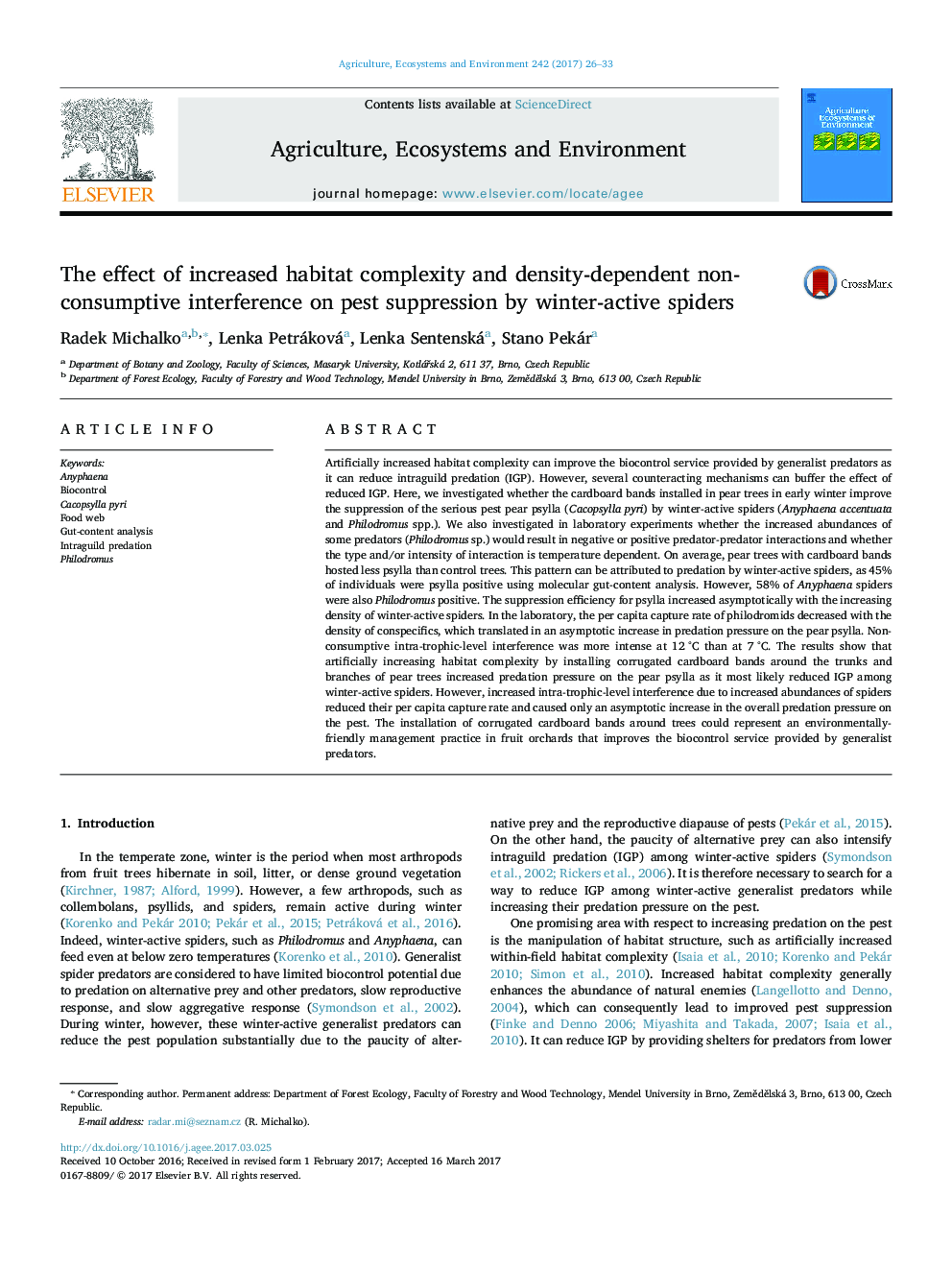| کد مقاله | کد نشریه | سال انتشار | مقاله انگلیسی | نسخه تمام متن |
|---|---|---|---|---|
| 5538137 | 1552010 | 2017 | 8 صفحه PDF | دانلود رایگان |
عنوان انگلیسی مقاله ISI
The effect of increased habitat complexity and density-dependent non-consumptive interference on pest suppression by winter-active spiders
ترجمه فارسی عنوان
اثر افزایش پیچیدگی زیستگاه و تداخل غیر تهاجمی وابسته به تراکم بر سرکوب آفات توسط عنکبوت های زمستانی فعال
دانلود مقاله + سفارش ترجمه
دانلود مقاله ISI انگلیسی
رایگان برای ایرانیان
کلمات کلیدی
موضوعات مرتبط
علوم زیستی و بیوفناوری
علوم کشاورزی و بیولوژیک
علوم زراعت و اصلاح نباتات
چکیده انگلیسی
Artificially increased habitat complexity can improve the biocontrol service provided by generalist predators as it can reduce intraguild predation (IGP). However, several counteracting mechanisms can buffer the effect of reduced IGP. Here, we investigated whether the cardboard bands installed in pear trees in early winter improve the suppression of the serious pest pear psylla (Cacopsylla pyri) by winter-active spiders (Anyphaena accentuata and Philodromus spp.). We also investigated in laboratory experiments whether the increased abundances of some predators (Philodromus sp.) would result in negative or positive predator-predator interactions and whether the type and/or intensity of interaction is temperature dependent. On average, pear trees with cardboard bands hosted less psylla than control trees. This pattern can be attributed to predation by winter-active spiders, as 45% of individuals were psylla positive using molecular gut-content analysis. However, 58% of Anyphaena spiders were also Philodromus positive. The suppression efficiency for psylla increased asymptotically with the increasing density of winter-active spiders. In the laboratory, the per capita capture rate of philodromids decreased with the density of conspecifics, which translated in an asymptotic increase in predation pressure on the pear psylla. Non-consumptive intra-trophic-level interference was more intense at 12 °C than at 7 °C. The results show that artificially increasing habitat complexity by installing corrugated cardboard bands around the trunks and branches of pear trees increased predation pressure on the pear psylla as it most likely reduced IGP among winter-active spiders. However, increased intra-trophic-level interference due to increased abundances of spiders reduced their per capita capture rate and caused only an asymptotic increase in the overall predation pressure on the pest. The installation of corrugated cardboard bands around trees could represent an environmentally-friendly management practice in fruit orchards that improves the biocontrol service provided by generalist predators.
ناشر
Database: Elsevier - ScienceDirect (ساینس دایرکت)
Journal: Agriculture, Ecosystems & Environment - Volume 242, 1 May 2017, Pages 26-33
Journal: Agriculture, Ecosystems & Environment - Volume 242, 1 May 2017, Pages 26-33
نویسندگان
Radek Michalko, Lenka Petráková, Lenka Sentenská, Stano Pekár,
